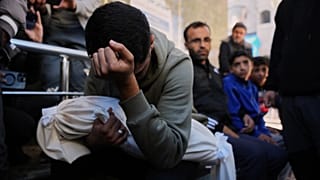Uganda
In just 15 years, sub-Saharan Africa has seen the number of people over 60 balloon by an estimated 50 per cent to about 67 million.
As people live longer, due to factors like better healthcare and lower child mortality, countries like Uganda are struggling to cope.
"It is a very difficult place for people to grow old. Especially, I have now become old, and I’m starting to feel the challenges of growing old," said 74-year-old Edith Wakumire.
While improvements in life expectancy are positive, as villages begin to fill with older people there is a dire shortage of support for them.
Pensions and social safety nets are minimal, medical care is lacking, and routine problems associated with age are often not addressed.
Kenneth Mugayehwenkyi, founder of Reach One Touch One ministries, explained why his organisation is one of the few helping the elderly.
"Seniors are not attractive. They are not sexy. They’re not fancy. When you see them, you see pain, you see suffering, you see close to end of life,” he said.
Respect for older people is deeply ingrained in African cultures, but even richer countries outside the continent are having trouble meeting the needs of their ageing populations.
Interviews across a dozen African countries and a review of research and data make it clear how few resources await those who reach old age on the continent.
“Everything is lacking,” says Dr Mie Rizig, a Sudanese-born neurologist at University College London who researches aging and dementia across Africa.
"The elderly are disregarded,” said Ugandan doctor, Emmanuel Mugerwa.
He said that in communities, it is the family that take care of the elderly, so the country itself has not allocated a lot of resources for this.
Worryingly, even more dramatic growth awaits, with the World Health Organization projecting that there will be 163 million older people in the region by 2050.
Mugayehwenkyi warns of a difficult situation if governments do not develop "policy frameworks for pensions, healthcare access, and caring for very frail".













Go to video
Uganda’s export earnings nearly double in October on coffee and gold sales
01:05
Uganda to receive $1.7 billion of US funding under new health deal
01:43
US-Kenya $2.5B health deal targets HIV, Malaria and Polio
01:13
United Nations decries crackdown on opposition ahead of Ugandan elections
00:54
Ugandan Police block NUP in Arua ahead of elections
00:52
Morocco beats Uganda 4-0, extends record winning run to 18